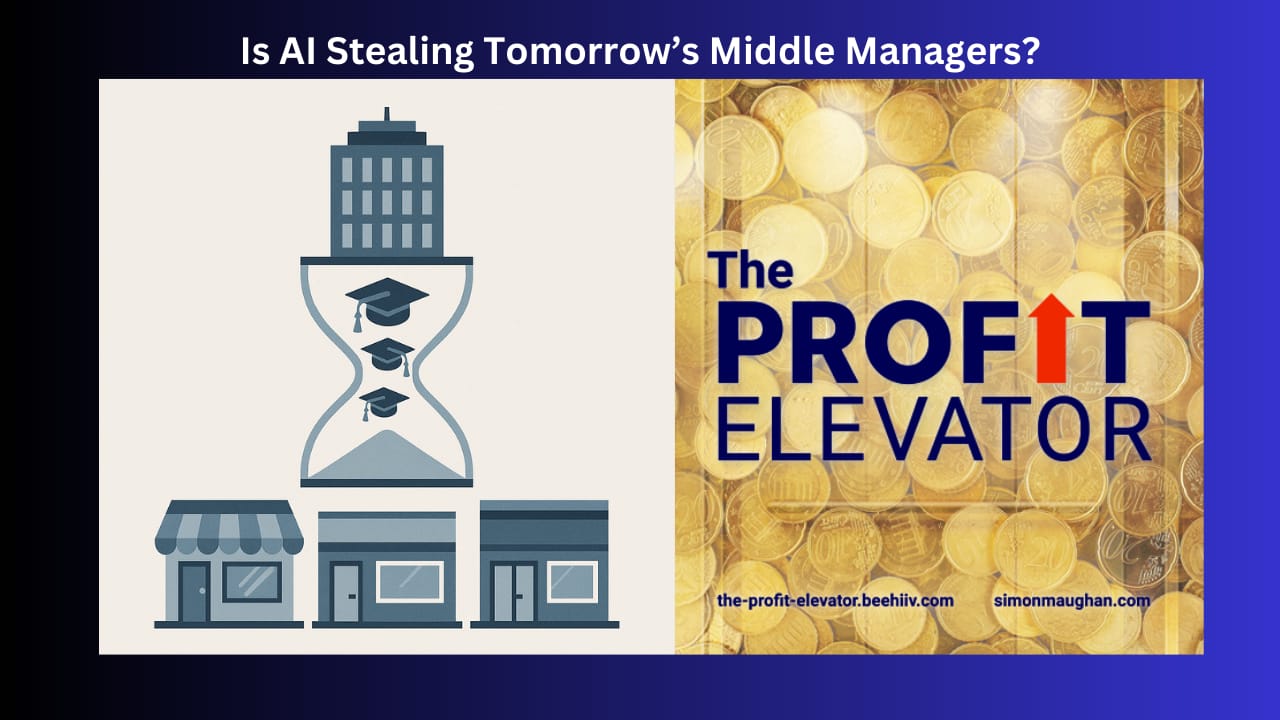
There has been a lot written about how big companies replacing graduate intakes with AI is short-sighted. Where are the managers of the future going to come from? The bigger question may be what happens to all the businesses who rely on poaching trained accountants, lawyers and bankers?
The numbers behind the slowdown
The Big Four professional-services firms have cut back this year’s UK graduate intake by up to 30%, eliminating roughly 1,000 trainee places compared with last year[1]. The firms cited fewer deals and shrinking consultancy pipelines rather than replacing people with AI.
In May, PwC announced it would lay off 1,500 US staff because “historically low attrition left us over-staffed”[2]. This highlights how these firms over hire, expecting trainees to leave.
Across all sectors, UK graduate openings are at their lowest since 2018. The picture is similar in the US. Bulge-bracket banks describe 2025 hiring as “tepid” after fees fell a further 12% year-on-year[3].
The Guardian bluntly calls it a “workforce crisis”, pointing to a one-third fall in entry-level office roles and the fiercest competition among graduates in a decade[4].
Why economists and educators are worried
Graduate schemes aren’t just a pipeline for blue-chip employers. They are the training ground for an entire ecosystem of SMEs that recruit fully-formed professionals. These businesses cannot afford to spend two years training staff in basic skills. They rely on large corporations to help young people make the transition to working life.
As a result, economists fear reduced graduate programmes could leave a three-to-five-year hole in the mid-management layer. That’s just as the demographic pressures of an ageing workforce and slowing birth-rates begin to bite.
Fewer trained auditors could hit finance departments at owner-managed firms. Fewer junior lawyers could raise the cost of compliance support for fast-growth tech companies. Meanwhile business schools warn that prolonged weakness dampens the perceived return on degrees, deterring the next cohort and potentially creating a vicious circle.
It isn’t all about AI
Blaming ChatGPT is convenient, but the data suggest three more powerful drivers.
eFinancialCareers reports banking deals are down 12% this year in the UK, which is not surprising with the economy barely growing. The Big Four admit that their estimates of up to 20% post-pandemic churn never materialised. And the rise in the minimum salary of a visa worker has cut offers to foreign graduates.
AI is displacing the most routine entry-level tasks, but its impact is incremental compared with the sudden drop-off in transaction volumes and the payroll bulge created by the 2021-22 scramble for talent.
Built-in redundancy is nothing new
Accountancy firms, investment banks and City law practices have always recruited more graduates than they expect to retain. The model assumes:
Exam attrition: 10-15% of trainee accountants fail professional papers.
Lifestyle attrition: another 15-20% exit by year three for better hours or industry roles.
Up-or-out promotion ladders: firms need a large base to yield the peak of the partner pyramid.
When attrition falls, because a weak economy makes juniors stay put, headcount balloons and reduced future hiring is the safety-valve. PwC’s low-turnover layoffs are a textbook example.
SMBs that rely on poaching “Big 4-trained” talent therefore shouldn’t be surprised by a temporary drought. The flow from the tap has been turned down.
Where demand is strong
While traditional graduate schemes shrink, experienced accountants, bankers and lawyers are still being wooed by fast-growing niches.
The Robert Half mid-year talent report reveals that professional services, manufacturing and transport firms remain in the market for financial planning analysts, controllers and cost accountants. The salary survey in the Accounting and Business magazine shows strong demand for digital bookkeeping and cash flow forecasting. Investment banks continue to lose junior talent to private equity firms. Linklaters’ 2025 energy outlook details demand for lawyers with project finance experience and analysts with tax-equity modelling skills.
Will we really run out of future managers?
The current smaller graduate pools mean SMEs may struggle to find newly qualified accountants or associates in 2028-30, when they would normally come off training contracts.
Yet market forces generally restore equilibrium. Once utilisation rises, the Big Four and the Magic Circle will reopen the spigots because their own leverage ratios depend on cheap junior labour.
Structural shifts to watch
Apprenticeships and degree-alternatives offer lower-cost, more flexible pipelines that bypass traditional graduate schemes. The recent peak in percentage of school leavers starting university suggests these alternatives have an impact at the margins.
Technology scale-ups, renewables and healthcare companies are building their own in-house training, reducing dependence on City giants. The same AI technology that threatens entry-level roles is also accelerating on-the-job learning, potentially shortening the time it takes to grow competent managers.
This will offset any risk that AI does mean a permanent reduction in junior accountants and lawyers.
Bottom line for SMB owners
A pause in graduate hiring today will not empty the talent pool forever. It might, however, herald a couple of lean years. If you anticipate hiring needs a year or two from now, it may be worth bringing recruitment forward if you have the cash flow. It is also time to look at part-qualified or career-change candidates and invest in accelerated development programmes for existing staff.
If you don’t want to run your own training, the ICAEW, ACCA and the Law Society are expanding Continuous Professional Development modules that suit mid-market employers. Finally, remote or hybrid arrangements remain a differentiator as larger firms demand more time in the office.
A genuine leadership vacuum will only emerge if companies and policymakers ignore the signals. History suggests they won’t. Talent pipelines may kink, but they rarely break, especially when competitive advantage is on the line.
Questions to Ask and Answer
Where do my best managers come from?
Is this a scalable source that I can tap again?
What training could I provide to would-be managers?
Find out more. Hit reply to this newsletter and ask about “Workforce AI Training”.
